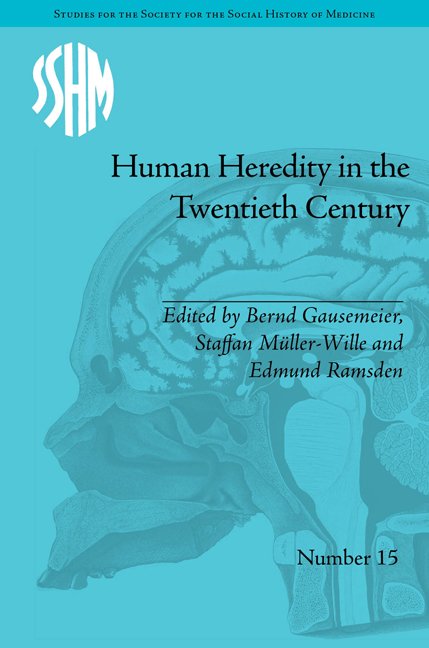Book contents
- Frontmatter
- Contents
- Acknowledgements
- List of Contributors
- List of Figures and Tables
- Introduction: Human Heredity in the Twentieth Century
- Part I Constructing Surveys of Heredity
- Part II Blood and Populations
- Part III Human Heredity in the Laboratory
- Part IV Understanding and Managing Disease
- 11 The Disappearance of the Concept of Anticipation in the Post-War World
- 12 ‘The Most Hereditary of All Diseases’: Haemophilia and the Utility of Genetics for Haematology, 1930–70
- 13 How PKU Became a Genetic Disease
- Part V Reconstructing Discipline(s)
- Notes
- Index
12 - ‘The Most Hereditary of All Diseases’: Haemophilia and the Utility of Genetics for Haematology, 1930–70
from Part IV - Understanding and Managing Disease
- Frontmatter
- Contents
- Acknowledgements
- List of Contributors
- List of Figures and Tables
- Introduction: Human Heredity in the Twentieth Century
- Part I Constructing Surveys of Heredity
- Part II Blood and Populations
- Part III Human Heredity in the Laboratory
- Part IV Understanding and Managing Disease
- 11 The Disappearance of the Concept of Anticipation in the Post-War World
- 12 ‘The Most Hereditary of All Diseases’: Haemophilia and the Utility of Genetics for Haematology, 1930–70
- 13 How PKU Became a Genetic Disease
- Part V Reconstructing Discipline(s)
- Notes
- Index
Summary
What dimensions of twentieth-century experience made medicine‘ genetic’ and genetics ‘medical℉? This question, deftly addressed in Nathaniel Comfort's The Science of Human Perfection: How Genes Became the Heart of American Medicine (2012), is a multifaceted problem. In consolidating his book's broader argument, Comfort explains how cytogenetics gave medical geneticists their ‘organ’ in the 1960s. The ‘gene’ then became to medical genetics what the heart already was to cardiology – a way of marking and legitimating professional identity. Yet, as Comfort also makes clear, medical geneticists’ ‘getting their organ’ only meant at this stage that physicians could deliver greater diagnostic accuracy and more refined preventive measures. Not until the 1980s and 1990s, with the rise of molecular medicine and gene transfer experimentation, did gene-based therapies emerge as a viable and sustained preoccupation for experimental physicians. Comfort's historical treatment of medical genetics confronts such conundrums by localizing medical interest in genetics in a much longer time frame – the long twentieth century (1890s to the present). Most contentiously, Comfort also challenges the ‘disingenuous’ idea among most practitioners of genetic medicine as well as a few of its historians that the eras of DNA (1950s–1960s), genomics (1970s–2000s) and post-genomics (2000s-present) have little in common with the expressly eugenic eras that preceded them. Comfort's interpretive framing of the problem makes clear why the histories of physicians' long-standing interest in hereditary disorders should matter to scholars interested in the histories of human genetics and medicine.
- Type
- Chapter
- Information
- Human Heredity in the Twentieth Century , pp. 165 - 178Publisher: Pickering & ChattoFirst published in: 2014



